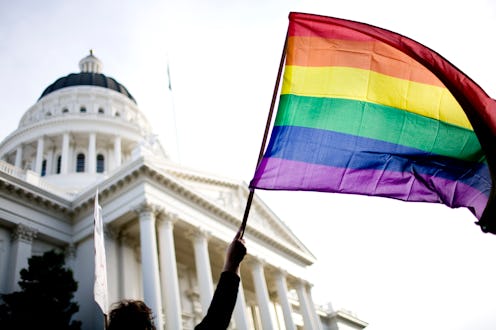News
Why Some Gay Rights Groups Won't Support ENDA
After the Supreme Court established in its Hobby Lobby ruling that closely-held companies could opt out of offering contraceptives to their employees, some gay rights groups are pulling support for the Equality Non-Discrimination Act — because of a religious exemption written into the bill. Fueled by SCOTUS' decision, the groups say that ENDA, as it is written, could be affected by the Hobby Lobby ruling, which made it legal for some companies to side skirt this major part of the Affordable Care Act based on religious beliefs. This is a major turn for many of the groups, which have shown long-term support of the legislation.
In an Advocate op-ed published on Tuesday, Rea Carey, the executive director of the National Gay and Lesbian Task Force, outlined the group's grievances with the bill that it has supported for two decades.
The morning the sun rose after the Supreme Court’s Hobby Lobby ruling, we all woke up in a changed and intensified landscape of religious exemptions being used as an excuse to discriminate. The reality is that while politics is about compromise, some compromises are too great.
The National Gay and Lesbian Task Force is joined by the American Civil Liberties Union, Lambda Legal and National Center for Lesbian Rights in its recent opposition to ENDA, citing the religious exemptions established by the Hobby Lobby case. In a statement, the Human Rights Campaign pledged continued support for ENDA "because it will provide essential workplace protections to millions of LGBT people."
Carey underlined a key change that the LGBT fight for equality has seen since the bill was introduced in 1994: The refusal to only take what they can get replaced with a hunger to fight for what they deserve.
Making compromises on ENDA over the years was about seeking out even the most rudimentary protections. Our efforts were not misdirected given the time. Today, however, is not 1994, and we have since had many catalysts for progress.
As Carey notes, when ENDA was introduced 20 years ago, there were very few victories on the federal or state level for LGBT equality. At the time, nine states had sexual orientation non-discrimination laws, but only one of those included gender identity. Still, any law that offered protections for the LGBT community was viewed as a victory.
As the country progresses towards marriage equality, the groups finally have room to start making demands. Currently, out of the 22 states with non-discrimination laws in place only three don't include gender identity.
Even "Don't Ask, Don't Tell," implemented by Clinton in the 90s, was a demeaning safeguard for the gays in the military. While designed as a protection against the pervasive anti-LGBT attitudes, the act only provided for scant protection rather than equal treatment.
By pulling their support, gay rights organizations are telling lawmakers that they won't settle for anything less than equality. And maybe, hopefully, they finally have the bargaining chips to get there.
